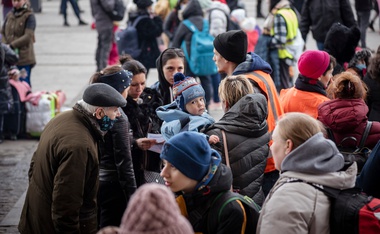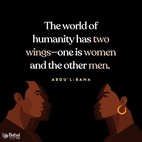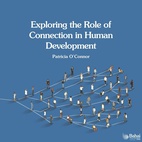The views expressed in our content reflect individual perspectives and do not represent the authoritative views of the Baha'i Faith.
If you listen carefully to the hundreds of interviews with those fleeing the war in Ukraine, you’ll hear a common theme: “War in Europe, again, in the 21st century? Why? We thought that was all in the past.”
One day, the Ukrainian people had a sense of normalcy, going to their tech jobs in their modern cars, listening to music, raising their children, walking in the park – and the next day, terrorized and fearful, under attack and bombardment, with death all around them, they were forced to flee.
You can imagine the turmoil, the anxiety, the sudden disorientation. Or, unless you’ve experienced it, maybe you can’t.
RELATED: How Does the Baha’i Faith Propose to Unify the World?
Understandably, many of us would have a very hard time dealing with a sudden outbreak of war in our country. You see that struggle in the shock, the long-distance stares, the obvious PTSD in the eyes of the refugees. You hear it in their voices, flattened and newly devoid of any sense of stability, happiness, or hope. Most have seen people killed, lost loved ones, left others behind, and have no idea where their next meal could come from or where they might sleep tonight. Their belief in the future and the stability they once had, now shattered and blown apart, has blasted a smoking bomb crater in the middle of their lives.
To add to their misery, the sudden violence of war threatens to demolish their faith in their fellow human beings and the governmental structures humanity has devised to protect us. War undermines everything good, replacing it with darkness and death.
Perhaps the stunned shock – not only of the refugees, but in all of us – comes from the false sense of security a few generations of relative peace have engendered in the developed world.
Since the end of World War II in 1945, wars in the so-called “developed nations” have mostly either ceased or been relatively limited and short. Among the populations of industrialized Europe, the United States, Japan, and many other countries around the world, at least two and maybe three generations have grown up with little or no experience of the displacement and disorder of war in their home countries. “A period of relative peace,” some observers have labeled the past three-quarters of a century, although that tends to ignore the fierce conflicts that have taken place in the Balkans, Africa, Central America, and Asia, and the proxy wars the superpowers have fought.
The Baha’i teachings offer a unique and sobering take on this “period of peace,” expressed here in Shoghi Effendi’s The World Order of Baha’u’llah:
Beset on every side by the cumulative evidences of disintegration, of turmoil and of bankruptcy, serious-minded men and women, in almost every walk of life, are beginning to doubt whether society, as it is now organized, can, through its unaided efforts, extricate itself from the slough into which it is steadily sinking. Every system, short of the unification of the human race, has been tried, repeatedly tried, and been found wanting. Wars again and again have been fought, and conferences without number have met and deliberated. Treaties, pacts and covenants have been painstakingly negotiated, concluded and revised. Systems of government have been patiently tested, have been continually recast and superseded. Economic plans of reconstruction have been carefully devised, and meticulously executed. And yet crisis has succeeded crisis, and the rapidity with which a perilously unstable world is declining has been correspondingly accelerated.
Can human society – as it is now organized – ever produce a lasting peace? No, the Baha’i teachings emphatically say.
As long as we continue to organize ourselves as a conflict-prone collection of a few hundred sovereign countries, we will inevitably resort to warfare to settle our differences. As long as we wantonly manufacture and stockpile weapons and maintain large military forces, they will be used. As long as we allow dictators, tyrants, and authoritarian leaders to rule, we will have violent outcomes. As long as we expend a huge portion of our resources to prepare for combat, we will have war.
In our current system of a few hundred autonomous national governments with widely divergent agendas, we have organized ourselves for war.
The Baha’i teachings warn us: without a wholesale and world-encompassing rejection of this “militant nationalism,” we will always be at risk of war breaking out. When the underlying structure of human society naturally engenders conflict, that’s what we’ll get. Instead, the Baha’i principles call for, in the words of Shoghi Effendi, “… a world community in which the fury of a capricious and militant nationalism will have been transmuted into an abiding consciousness of world citizenship.”
RELATED: Can We Have a Flag for Our Planet?
How can we possibly build that “abiding consciousness of world citizenship?” It begins in the hearts of every human being, when we each decide to transcend our provincial and patriotic identities and start to define ourselves as global citizens, as members of the human family. We can do this, as Shoghi Effendi wrote in this definitive 1947 statement about the Baha’is to the nascent United Nations, if we view humanity “as one entity:”
Though loyal to their respective governments, though imbued with the love of their own country, and anxious to promote, at all times, its best interests, the followers of the Baha’i Faith, nevertheless, viewing mankind as one entity, and profoundly attached to its vital interests, will not hesitate to subordinate every particular interest, be it personal, regional or national, to the over-riding interests of the generality of mankind, knowing full well that in a world of interdependent peoples and nations the advantage of the part is best to be reached by the advantage of the whole, and that no lasting result can be achieved by any of the component parts if the general interests of the entity itself are neglected.
But developing that abiding consciousness of the oneness of humanity and of world citizenship also happens on the international level, as well. It occurs when nations band together for collective security. It manifests itself when countries recognize their interdependence and work out ways to cooperate in trade, technology, environmental, and immigration policies. Most importantly, it achieves supreme importance when the world’s countries unite to stop war, collaborating, consulting together, and building coalitions to oppose what the Baha’i writings call “the anarchy inherent in state sovereignty:”
Unification of the whole of mankind is the hall-mark of the stage which human society is now approaching. Unity of family, of tribe, of city-state, and nation have been successively attempted and fully established. World unity is the goal towards which a harassed humanity is striving. Nation-building has come to an end. The anarchy inherent in state sovereignty is moving towards a climax. A world, growing to maturity, must abandon this fetish, recognize the oneness and wholeness of human relationships, and establish once for all the machinery that can best incarnate this fundamental principle of its life.
If you oppose war; if you’re horrified by its death and destruction; if you want to end the pain and suffering of its future victims; if you wish for a stable, peaceful, united planet; you can best work for its permanent eradication by becoming a world citizen. The Baha’is of the world invite you to join us in that peaceful quest.

















Comments
Sign in or create an account
Continue with Googleor